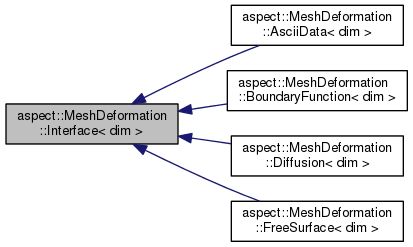 |
ASPECT
|
 |
ASPECT
|

Public Member Functions | |
| virtual bool | needs_surface_stabilization () const |
| virtual Tensor< 1, dim > | compute_initial_deformation_on_boundary (const types::boundary_id boundary_indicator, const Point< dim > &position) const |
| virtual void | compute_initial_deformation_as_constraints (const Mapping< dim > &mapping, const DoFHandler< dim > &mesh_deformation_dof_handler, const types::boundary_id boundary_indicator, AffineConstraints< double > &constraints) const |
| virtual void | compute_velocity_constraints_on_boundary (const DoFHandler< dim > &mesh_deformation_dof_handler, AffineConstraints< double > &mesh_velocity_constraints, const std::set< types::boundary_id > &boundary_ids) const |
 Public Member Functions inherited from aspect::Plugins::InterfaceBase Public Member Functions inherited from aspect::Plugins::InterfaceBase | |
| virtual | ~InterfaceBase ()=default |
| virtual void | initialize () |
| virtual void | update () |
| virtual void | parse_parameters (ParameterHandler &prm) |
| virtual void | save (std::map< std::string, std::string > &status_strings) const |
| virtual void | load (const std::map< std::string, std::string > &status_strings) |
Additional Inherited Members | |
 Static Public Member Functions inherited from aspect::Plugins::InterfaceBase Static Public Member Functions inherited from aspect::Plugins::InterfaceBase | |
| static void | declare_parameters (ParameterHandler &prm) |
A base class for mesh deformation plugins. Each derived class should implement a function that determines the deformation velocity for certain mesh vertices and store them in a AffineConstraints<double> object. The velocities for all non-constrained vertices will be computed by solving a Laplace problem with the given constraints.
Definition at line 89 of file interface.h.
|
virtual |
A function that will be called to check whether stabilization is needed.
Reimplemented in aspect::MeshDeformation::Diffusion< dim >, aspect::MeshDeformation::FreeSurface< dim >, aspect::MeshDeformation::AsciiData< dim >, and aspect::MeshDeformation::BoundaryFunction< dim >.
|
virtual |
A function that returns the initial deformation of points on the boundary (e.g. the surface vertices). position is the undeformed position and this function is expected to return the displacement vector of this position. The default implementation returns a zero displacement (= no initial deformation).
Reimplemented in aspect::MeshDeformation::AsciiData< dim >.
|
virtual |
A function that creates constraints for the initial deformation of the mesh.
This function gives an alternative way to determine the initial deformation instead of using the compute_initial_deformation_on_boundary function. The default implementation of this function calls compute_initial_deformation_on_boundary() with the coordinates of each point on the boundary. If you need lower level control over the initial deformation or it is more efficient to provide constraints directly, override this function.
|
virtual |
A function that creates constraints for the velocity of certain mesh vertices (e.g. the surface vertices) for a specific set of boundaries. The calling class will respect these constraints when computing the new vertex positions. The default implementation creates no constraints.
Reimplemented in aspect::MeshDeformation::Diffusion< dim >, aspect::MeshDeformation::FreeSurface< dim >, and aspect::MeshDeformation::BoundaryFunction< dim >.